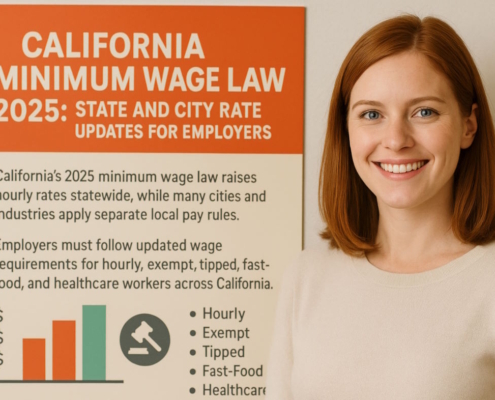Understanding California Wage Payment Laws
In California, employers are legally required to pay employees their wages on time. According to the California Labor Code Section 204, employees are legally entitled to pay within a specific window of time after the work they’ve performed. Work performed between the 1st and 15th days of the month should appear on your paycheck between the 16th and 26th day of that same month. For work done between the 16th and the end of a month, payment must be made between the 1st and 10th of the following month. How long can an employer not pay you? Generally, employers are required to adhere to these timelines or face penalties.
If an employer fails to pay employees on time, this is considered a violation of state and federal wage and hour laws. The Fair Labor Standards Act (FLSA) states that employers must pay their employees promptly for all the hours those employees have worked. How long does an employer have to pay you after payday? Employers must meet the next regular payday following the pay period, ensuring timely compensation.
Penalties for Late Payment of Wages
Employers in California who face unpaid wages have the right to file a claim or take legal action to seek proper compensation. Filing a complaint with the California Labor Commissioner’s Office can help investigate if an employer has violated labor laws, such as not paying employees on time or issuing late paychecks. My employer didn’t pay me on payday, what can I do? Employees can take steps such as filing a wage claim or seeking legal advice.
What to do if your employer doesn’t pay you? Employees should first document all missed payments and hours worked, then contact their employer’s HR or payroll department to resolve the issue.
Late payment of wages can lead to financial penalties under California Labor Code 210. Employers who fail to pay employees on time may face fines for each violation. The first violation incurs a $100 penalty, and additional violations may result in $200 penalties plus 25% of the unpaid wages. Employees are also entitled to recover damages such as back pay, interest for delayed paychecks, and payment of attorney fees and court costs. What is the penalty for late paycheck issuance? These penalties are designed to protect employees and deter non-compliance.
Example of Consequences for Employer When Not Paying Employee on Time.
Fact
The employer, XYZ Corporation, was contractually obligated to pay its employee, Jane Doe, her biweekly wages of $2,000 on November 1, 2023, pursuant to the company’s payroll policy. However, the payment was not issued until November 11, 2023, resulting in a 10-day delay. During this period, the employee incurred late fees on her rent payment due to the non-receipt of wages and experienced financial stress.
Analysis
Under California Labor Code Section 204, employers are required to pay wages no less frequently than twice a month and within specific timeframes following the close of a pay period. A 10-day delay in issuing wages constitutes a violation of these statutory requirements. Additionally, California Labor Code Section 210 provides for penalties against employers who fail to meet their wage payment obligations. These penalties are intended to deter such conduct and to compensate employees for the inconvenience and harm caused by delayed payments.
In Jane Doe’s case, the employer’s delay of 10 days not only breached statutory requirements but also resulted in tangible financial harm to the employee. She incurred late fees on her rent payment and suffered undue stress due to the lack of timely wages. The statutory framework exists to prevent such outcomes and ensure employees are paid promptly for their work. Courts have consistently upheld that timely payment of wages is a fundamental right of employees, and deviations from this standard are subject to enforcement actions.
Conclusion
Based on the facts and legal analysis, XYZ Corporation’s 10-day delay in paying wages to Jane Doe constitutes a clear violation of California Labor Code Section 204. The company may be subject to penalties under Section 210 for its failure to comply with statutory wage payment requirements. Furthermore, Jane Doe may have a claim for reimbursement of her incurred late fees and other damages stemming from the delay. To resolve this issue, XYZ Corporation should promptly address the late payment, compensate Jane Doe for any associated losses, and implement corrective measures to prevent future occurrences.
Rules for Final Paychecks
For final paychecks, the rules differ based on whether the employee was terminated or resigned. If you’ve been fired, California law says that your employer is required to pay you all remaining unpaid wages at the time of your termination. If you leave your job voluntarily and don’t give notice ahead of time, your employer has 72 hours to pay you. If you give 72 hours’ notice before quitting, your final paycheck must be ready on your last day of work.
What if my employer doesn’t pay me on time? Failure to comply with these laws can result in waiting time penalties. Employers who don’t pay a departing employee in the required time period must pay the employee’s daily wage rate for each day the payment is late, up to a maximum of 30 days. This penalty is intended to encourage employers to comply with wage and hour labor laws.
Understanding Unpaid Work Violations
Unpaid work violations also encompass situations where employers fail to compensate employees for all hours worked, including overtime and meal and rest breaks. California law mandates that employees be paid for all hours worked, and employers must ensure compliance with minimum wage and overtime requirements. I didn’t get my paycheck on payday—employees who face such violations can take steps to address the issue, including documenting their work hours, contacting their employer, or filing a lawsuit to recover unpaid wages.
Is it illegal to get paid in cash? While paying employees in cash is legal, employers must still provide detailed wage statements and comply with tax obligations.
Federal Law and Willful Non-Payment
Under the FLSA, a willful non-payment occurs when an employer knowingly fails to pay wages or is aware of their inability to make payroll. Is it illegal to not pay employees on time? Yes, such actions violate federal and state laws. In these cases, the law imposes a penalty called liquidated damages, which requires the employer to pay double the amount of unpaid wages plus interest. Ignorance of the law is not a defense, and employers must fully understand the legal requirements surrounding timely wage payments.
Can my employer make me work without pay? No, requiring employees to work without compensation is a violation of federal and state labor laws.
What To Do If Your Employer Doesn’t Pay You?
Call me and I will get your money and all the late fee penalties owed to you! I get a contingent fee from what money I get for you. Employees facing delayed payments or unpaid wages can take specific actions to ensure they receive compensation:
- Contact the Employer: Reach out to the company’s HR or payroll department to address concerns about late employee wages. Payroll processing errors or administrative oversights may be the cause and can often be resolved quickly. What happens if your employer doesn’t pay you on time? Begin by addressing the issue with them directly.
- Document Everything: Keeping detailed records of work hours, pay schedules, and any incidents of not being paid on time is crucial evidence for proving employer negligence.
- File a Complaint with the Labor Commissioner’s Office: If the issue persists, employees can file a complaint to trigger an investigation into potential labor law violations. What do I do if my employer doesn’t pay me? Filing a complaint is a structured first step.
- Seek Legal Advice: Consult a knowledgeable California employment law attorney to understand your rights and explore legal options for recovering unpaid wages. Can you sue a company for not paying you on time? Yes, legal action may be necessary to enforce your rights.
- File a Lawsuit: As a last resort, employees can file a lawsuit to recover owed wages, penalty pay, and additional damages caused by delayed payments. What is penalty pay? This refers to the additional compensation owed to employees due to employer non-compliance with wage laws.
What if your employer doesn’t pay you on time? Employees may be entitled to back pay, penalty fees, and interest for each day the payment is late.
The Importance of Compliance
State and federal laws are clear about employers’ responsibilities to pay employees on time. Employers who fail to pay wages on time are subject to penalties designed to protect employees’ rights and deter wage theft. Late paycheck penalties in California are significant, reflecting the importance of adhering to labor standards.
What happens if an employer doesn’t pay you? Delayed payments may result in financial and legal consequences for the employer, including penalties and interest payments. If payday falls on a Sunday in California, employers must ensure payments are made promptly on the next business day.
What happens if a company can’t make payroll? Employers who fail to meet payroll obligations may face severe legal and financial penalties, including lawsuits and investigations by labor authorities.
Conclusion
Navigating wage payment issues can be challenging, but knowing your rights is the first step toward ensuring fair treatment in the workplace. Employees have various options for seeking justice when labor laws are violated, from filing claims with labor departments to pursuing legal action. If you’re facing delayed payments or unpaid wages, understanding your rights and taking timely action can help ensure compliance with labor laws and safeguard your financial well-being. My paycheck is late—employees who encounter such issues should act quickly to address them. By being informed and proactive, you can effectively address these issues and secure the wages you deserve.































